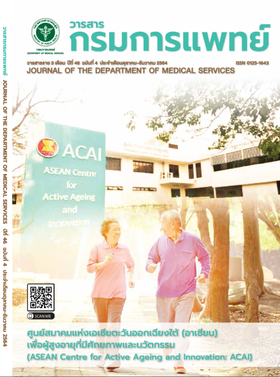The Development of the Mindfulness Program on Strengthen Relapse Prevention Skills among Persons with Heroin Addictions
Keywords:
Mindfulness program, Relapsed preventive skills, Patients with heroineAbstract
Background: The statistics of relapse patients with heroine addition, had been treated, was reported at 91-95 percent. There was a high relapse rate. Therefore, meditation and relapsed preventive skills could be deceased heroin relapse. Objective: To develop mindfulness program for patients with heroine addition. Method: The research and development consisted of 2 phases; (1) to develop a mindfulness program included 1.1) to review literature, 1.2) to draft a mindfulness program,1.3) to test content validity by 5 experts, and (2) to try out the meditation program with 10 patients with heroine addition by purposive sampling and following evaluation of relapsed preventive skills. Data were analysis by Wilcoxon signed-ranks test. Results: the mindfulness program on enhancing relapsed preventive skills for patients with heroine addition was group activity, consisted of 8 activities: 1) greeting 2) awareness of relapse 3) here and now 4) my risk 5) my craving 6) problem solving 7) be aware of emotion, cognition, and behavior and 8) far away from illegal drugs. The group activities included 16 times, each activity 50-95 mins, and twice a week. Content validity of the program was tested, yielding a value of .83. Consideration, the median of the self-efficacy, coping, refusal, and decision-making skills’ score of patients after participated the program had significantly higher score than the patients before participated the program Conclusion: the mindfulness program could increase relapsed preventive skills for patients with heroin. Therefore, the program could be implication on patients with heroin who had been treated in hospitals.
References
Hanpatanachaikun K. The relapsing of drug addiction patients at Thunyarak lnstitute and The Regional Drug Dependence Treatment Center. Khon Kaen : Khon Kaen Drug Treatment Center; 2007.
Bevan E. The effect of mindfulness training on drug craving is moderated by level of negative affect. A Doctoral project in Clinical Psychology, Marywood University; 2010.
Trondheim. Patients with Substance Use Disorders An investigation of Relapse, Substance Use and Recovery.
Unpublished doctoral dissertation. Science and Technology Faculty of Social Sciences and Technology Management Department of Psychology,Norwegian University; 2011.
Wirachai W, Srisawang P, Thipayawon T, editors. Methadone Maintenance Treatment. Bangkok: Chulalongkorn University; 2010.
Thanyarak Pattani Hospital. Patient statistics. Annual report; 2015.
Sornla K. The effect of mindfulness training program on alcohol craving of inpatient alcohol dependence receiving detoxification. Master of Nursing Science Thesis, Nursing Science (Mental Health Nursing and Psychiatry), Faculty of Nursing. Bangkok: Chulalongkorn University;2012.
Witkiewitza K, Bowen S, Douglasc H, Hsu SH. Mindfulnessbased relapse prevention for substance craving. Addict Behav 2013; 38:1563–71.
Witkiewitz K, Marlatt GA, Walker D. Mindfulness-based relapse prevention for alcohol and substance use disorders. Journol of Cognitive Psychotherapy 2005;19:221-8.
Gupradit W, Pinpradit N, Raksasataya S. The program development for assisting adolescences in avoiding narcotics through self-efficacy and self-control. KKU Research Journal (Graduate Studies) 2008; 8:100-10.
Bowen S, Witkiewitz K, Dillworth TM, Chawla N, Simpson TL, Ostafin BD, et al. Mindfulness meditation and substance use in an incarcerated population. Psychol Addict Behav 2006; 20:343–7.
Timothy Brian Eagan. Treatment of substance Use Disorders by coping with Drug craving Through the Use of Meditation: A Program Development. Unpublished doctoral dissertation, Psychology of Chicago School; 2010.
Zgierska AE, Burzinski CA, Cox J, Kloke J, Singles J, Mirgain S, et al. Mindfulness meditation-based intervention is feasible, acceptable, and safe for chronic low back pain requiring long-term daily opioid therapy. J Altern Complement Med 2015; 22: 610–20.
Bowen S, Chawla N, Collins SE, Witkiewitz K, Hsu S, Grow J, et al. Mindfulness-based relapse prevention for substance use disorders: a pilot efficacy trial. Substa Abuse 2009;30: 295-305.
Witkiewitz K, Bowe S, Douglas H, Hsu SH. Retraining the addicted brain: a review of hypothesized neurobiological mechanisms of mindfulness-based relapse prevention. Psychol Addict Behav 2013;27:351-65.
Luberto CM, Cotton S, McLeish AC, Mingione CJ, M.O’Bryan E. Mindfulness Skills and Emotion Regulation: the Mediating Role of Coping Self-Efficacy Mindfulness 2013; 5:1-10.
Bowen S, Witkiewitz K, Clifasefi SL, Grow J, Chawla N, Hsu SH, et al. Relative efficacy of mindfulness-based relapse prevention, standard relapse prevention, and treatment as usual for substance use disorders: a randomized clinical trial. JAMA Psychiatry 2014; 71:547-56.
Marlatt G, Witkiewitz K, Dillworth T. Vipassana meditation as a treatment for alcohol and drug use disorders. In: Hayes SC, Follette VM, linehan MM, (eds.). Mindfulness and Acceptance: Expanding the Cognitive-Behavioral Traditional. NY: Guilford ;2004.
Lyonsa T, Womackb V, Cantrellc WD, Kenemore T. Mindfulness Based Relapse Prevention in Jail Drug Treatment Program. Subst Use Misuse 2019; 54: 57–64.
Downloads
Published
How to Cite
Issue
Section
License

This work is licensed under a Creative Commons Attribution-NonCommercial-NoDerivatives 4.0 International License.
บทความที่ได้รับการตีพิมพ์เป็นลิขสิทธิ์ของกรมการแพทย์ กระทรวงสาธารณสุข
ข้อความและข้อคิดเห็นต่างๆ เป็นของผู้เขียนบทความ ไม่ใช่ความเห็นของกองบรรณาธิการหรือของวารสารกรมการแพทย์



